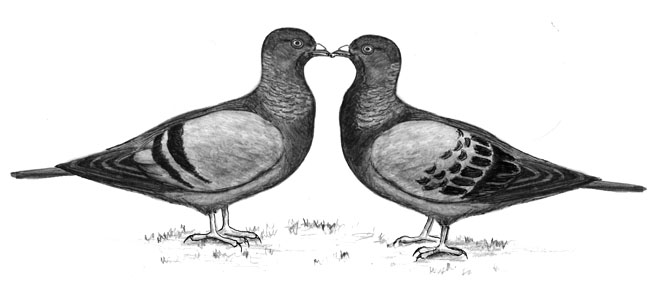
Dear Bird Folks,
When we lived in Chicago we had pigeons in our yard. Then we moved to Pennsylvania and once again we had pigeons in our yard. What are the chances of that? Also, my neighbor recently told me that a pigeon will not take another mate if its current mate dies. That got me thinking about my own relationship and….
– Brenda, Chicago/Pennsylvania
Sorry, Brenda,
Sorry, but I had to cut you off. The other readers don’t know it, but after you wrote “relationship and…” your note went on for another two hundred words. I wouldn’t have eliminated the rest if it had been about birds, but you veered off into a discussion about your relationship with your husband and other personal stuff. It’s not that the readers would have minded hearing a little domestic drama; they’d probably enjoy the change, but it’s not something I feel qualified to comment on. I can’t remark on your relationship with your husband, because I’ve never had a husband of my own. Until I do, I’d rather talk about birds. Besides, birds are better than most husbands anyhow.
I think the odds of having pigeons in both your yard in Chicago and in PA are pretty good. With an estimated population of 200-400 million, the number of pigeons in the world is nearly as high as the world’s dog population (which is also around 400 million, with about half that number living on Cape Cod). No matter where you go you aren’t likely to get away from pigeons. But at least pigeons don’t bark, chew the furniture or roll in dead things.
About pigeons never taking a new mate: that’s not really how it works. Oh sure, pigeons do tend to stay together for life, but they’ll readily pick up a new mate if there’s a death in the family. (I think a pigeon only uses that “I will never marry again” line just to get a little action.) I know pigeons are kind of mundane birds, but when it comes to courting, they are actually rather romantic, kind of lovey-dovey if you will. Go to any urban park in the spring and you’ll see quite a show. Pigeons have an assortment of mating rituals that includes bowing, tail dragging and wing clapping. The two birds will also preen each other, which looks a little like cuddling (aka, lovey-dovey). They will also feed each other. Many birds perform mate feeding and humans tend to think it’s rather sweet, but it’s not so sweet the way pigeons do it. Instead of passing a bit of fresh food to his mate, the male pigeon has the charming habit of regurgitating some of his ABC food into his mate’s mouth. And amazingly, she doesn’t mind. Now that’s true love.
What’s interesting about the world’s huge pigeon population is that it only increases by two birds at a time. Whereas some birds have large clutches, as many as twenty-eight eggs in a single nest, pigeons only have two kids per nest. (Any more than that makes it too hard for them to keep track of all the birthdays and soccer games.) Now the question is: If they only have two babies at a time, why do we have so many pigeons? That’s because pigeons have figured out how to live off humans by taking advantage of our sloppy ways. With people unintentionally supplying scraps of food, pigeons are able to have an extended breeding season, which allows them to crank out three or four broods a year. In addition, pigeons are good parents. Unlike other baby birds, you aren’t likely to find a flightless, young pigeon on the ground. That’s because young pigeons (aka, squab) are allowed to remain in the nest longer than most other birds. Pigeon babies won’t leave home until they are good and ready. But if a squab does leave the nest early, it generally doesn’t survive very long and is usually found dead…with a dog rolling on it.
Many people don’t like pigeons. They think pigeons are disgusting and carry diseases. Well, only one of those things is totally true. Pigeon nests are totally disgusting. To prevent predator attraction, most birds keep the area around their nest nice and tidy. For example, last year chickadees built a nest in a box near my bedroom. After the birds left, I opened the box to clean it out. That’s when I discovered that, except for the soft nesting material, the inside of the box was totally spotless (certainly a lot cleaner than my bedroom). Chickadees, like most songbirds, carry away their baby birds’ droppings. But pigeons don’t like doing that. (Can you blame them?) Their babies just poop wherever they want. By the time they leave their nest, it looks like a college dorm at the end of the year.
But the good news is those disgusting nests aren’t the major health problem we once thought they were. While pigeon related illnesses are possible, they aren’t very common. It turns out that pigeons cause far fewer illnesses than the ones caused by rats, flies and the food sold in convenience stores. However, there is one rare disease that sometimes affects people who raise pigeons. It is called (and I am not kidding) “Bird fancier’s lung.” I’m not sure what this illness actually is, but I think I would probably just let myself die before I told anyone I had a case of Bird fancier’s lung.
No matter where you move to, Brenda, there’s a good chance that pigeons will be living close by. BTW: I hope things get back on track between you and your husband. But don’t let him romance you pigeon-style. I mean if he tries to regurgitate some ABC food into your mouth, it’s probably time to see a marriage counselor.